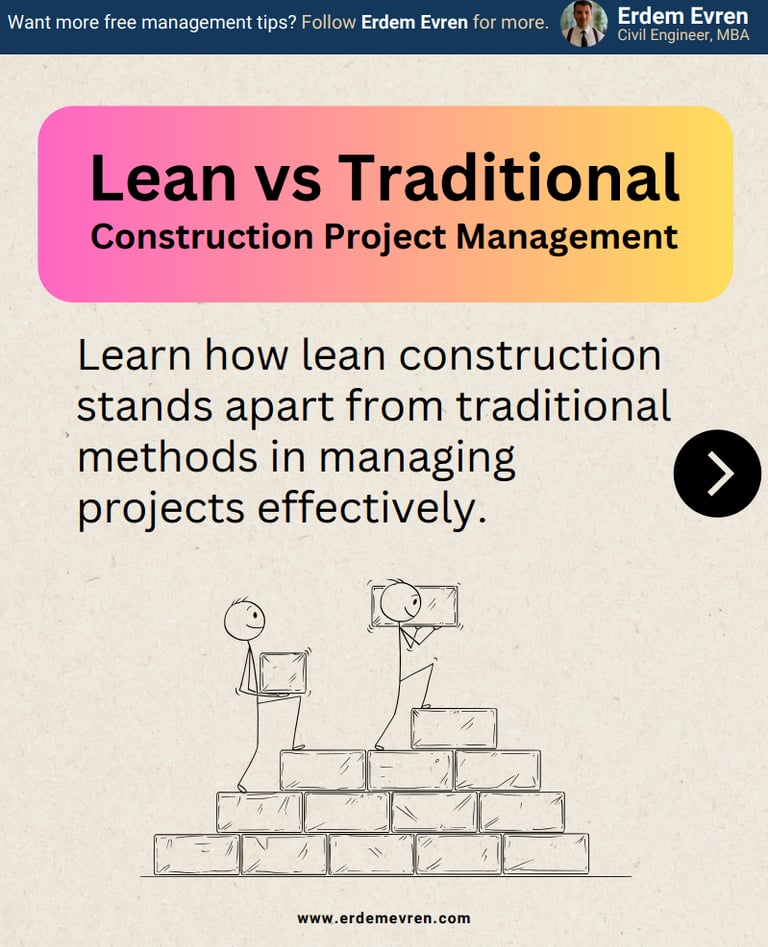Lean vs Traditional Project Management – Key Differences
Concise yet insightful!


🎖️𝗟𝗲𝗮𝗻 𝗖𝗼𝗻𝘀𝘁𝗿𝘂𝗰𝘁𝗶𝗼𝗻 𝘃𝘀. 𝗧𝗿𝗮𝗱𝗶𝘁𝗶𝗼𝗻𝗮𝗹 𝗣𝗿𝗼𝗷𝗲𝗰𝘁 𝗠𝗮𝗻𝗮𝗴𝗲𝗺𝗲𝗻𝘁: 𝗪𝗵𝗶𝗰𝗵 𝗔𝗽𝗽𝗿𝗼𝗮𝗰𝗵 𝗜𝘀 𝗥𝗶𝗴𝗵𝘁 𝗳𝗼𝗿 𝗬𝗼𝘂𝗿 𝗡𝗲𝘅𝘁 𝗣𝗿𝗼𝗷𝗲𝗰𝘁? 🏗️
As the construction industry evolves, so do the methods we use to manage projects. Two approaches, lean construction and traditional project management, offer distinct ways to achieve project success — but they are suited for different types of projects.
🔎 Lean Construction focuses on optimizing processes, reducing waste, and maximizing value for the client. It’s perfect for projects that require flexibility and continuous improvement, fostering collaboration at every stage.
🔍 On the other hand, Traditional Project Management often emphasizes minimizing costs and sticking to the project scope with a top-down decision-making structure. It works best for projects with clearly defined goals and less need for adaptation.
📌 𝗛𝗲𝗿𝗲’𝘀 𝗮 𝗯𝗿𝗲𝗮𝗸𝗱𝗼𝘄𝗻 𝗼𝗳 𝘁𝗵𝗲 𝗸𝗲𝘆 𝗱𝗶𝗳𝗳𝗲𝗿𝗲𝗻𝗰𝗲𝘀:
1️⃣ Waste Reduction vs. Cost Minimization:
Lean construction aims to eliminate unnecessary steps and improve resource use. Traditional management, however, prioritizes minimizing costs, which sometimes leads to inefficiencies.
2️⃣ Collaboration vs. Hierarchical Decision-Making:
Lean construction thrives on cross-functional collaboration, empowering everyone to make decisions. Traditional management often relies on a top-down approach, which can slow decision-making and innovation.
3️⃣ Continuous Improvement vs. Fixed Plans:
Lean is all about continuous improvement and adapting to challenges along the way. Traditional project management sticks to a fixed plan, which can be too rigid in today’s dynamic construction landscape.
4️⃣ Customer Value vs. Scope Adherence:
Lean construction is driven by customer value, ensuring that the final product meets evolving client needs. Traditional project management emphasizes sticking to the initial scope, which can sometimes miss the mark if client needs change.
💡 𝗪𝗵𝗲𝗻 𝗦𝗵𝗼𝘂𝗹𝗱 𝗬𝗼𝘂 𝗨𝘀𝗲 𝗘𝗮𝗰𝗵 𝗔𝗽𝗽𝗿𝗼𝗮𝗰𝗵?
If your project demands adaptability, innovation, and a customer-first mentality, lean construction is your best bet. For projects with a well-defined scope and minimal flexibility, traditional project management may be the way to go.
